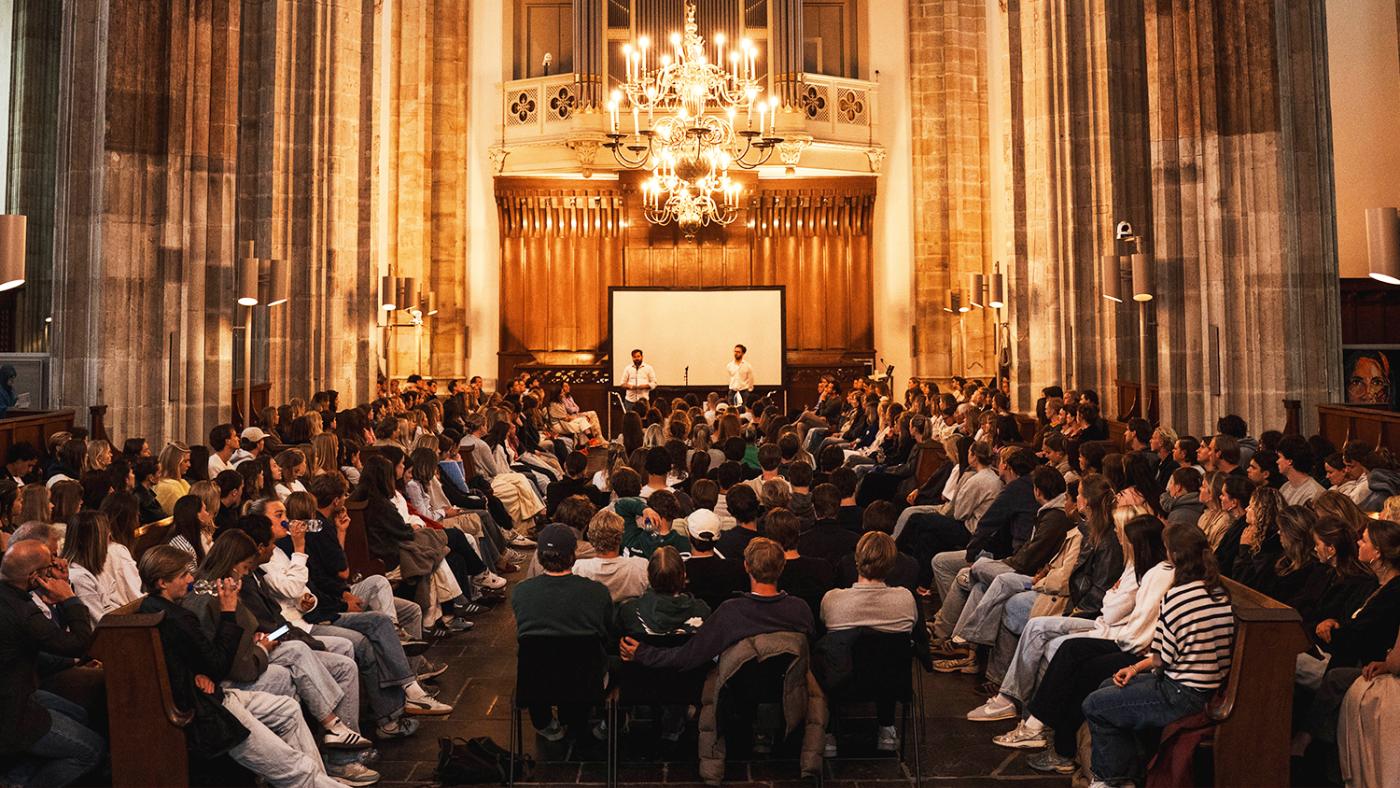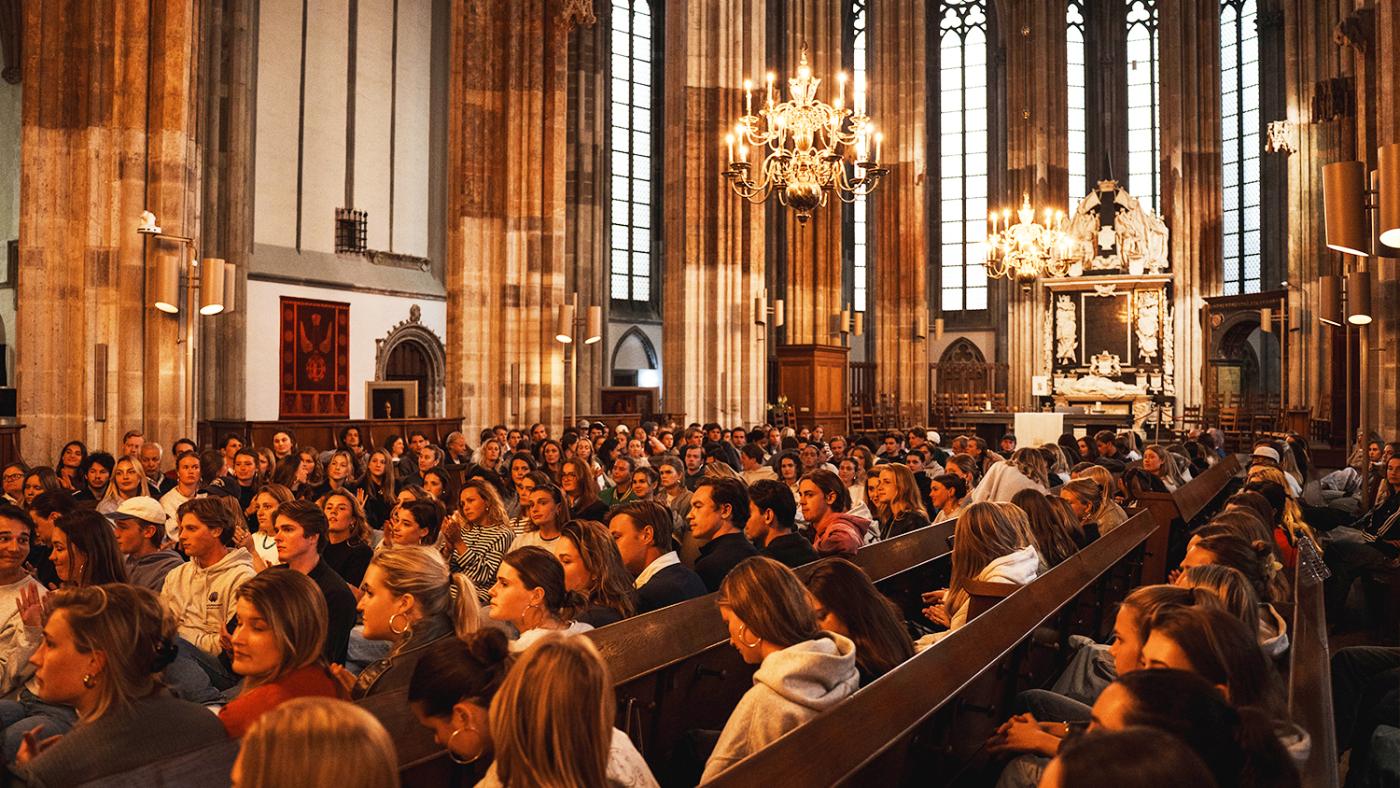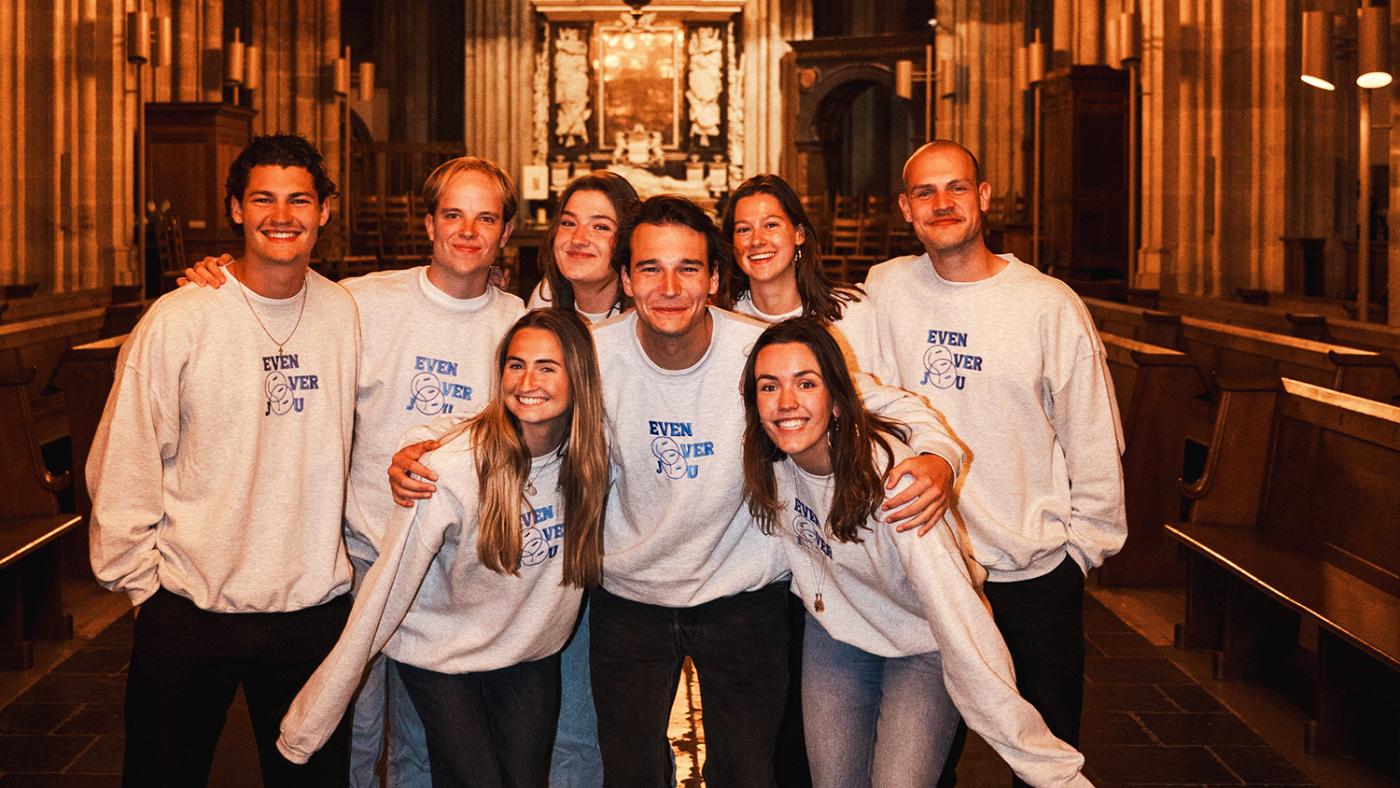Working on well-being as part of cultural change
USC and UVSV talking about what is often left unsaid

The third edition of the Welfare Week organised by the male and female student associations in Utrecht kicked off on 6 May. On the first day, four hundred members gathered in the Dom Church. It was compulsory for first-year students, but many older students also turned up. The turnout was higher than expected. "We even had to bring in extra chairs."
According to those responsible, UVSV president Jopke van Dobbenburgh and USC vice-president Nicolaas de Gaay Fortman, the welfare week is really necessary. "Since corona, we have noticed at the USC that mental health issues among members have become more visible and urgent," says Nicolaas. For example, the USC had to deal with members who took their own lives. "Then you know that as an association, you have to take responsibility and actively do something."
A little about you
The associations organised a welfare week during the same period in which Utrecht University is also focusing on student welfare. There are two reasons for this, say Nicolaas and Jopke. Firstly, members feel more comfortable speaking out when they are among people they know. Secondly, mental well-being also plays a key role at the club and in association buildings, which is also a focus during their own week.
The kick-off of the well-being week, with the theme Even over jou (A little bit about you), was given by alderwoman Eva Oosters and Wilma Scholte op Reimer, chair of the board of the Utrecht University of Applied Sciences.
Scholte hoped that the well-being week would contribute to the necessary cultural change. She mentioned the incidents that had brought the USC into the news in a negative light: the publication of a bangalijst (a list of students who are easy to bully), the socially unsafe house culture and the misconduct of beach guards on Texel. Nicolaas acknowledges that these incidents are a problem within the association.
"We have good contact with institutions such as the UU and HU, and collaborations such as during the welfare week contribute to us understanding each other better and working together on a healthy association culture. We understand that these cases are being followed with extra scrutiny, but at the same time we also see a clear willingness to improve within our houses."

Photo Lotte Nijhof
How are you?
The topics discussed on the first day of the welfare week seemed to strike a chord with many people. The various speakers who took the floor after the chair of the board and talked about the mental health issues they themselves had struggled with received many questions from the audience. The theme of the week was therefore “Talking about what is often left unsaid”.
Sophie van den Enk, winner of the TV show Wie is de Mol and presenter, talked about her depression during her student days; writer Harmen van Liemt talked about the loss of his sister who died of cancer. Influencer Martijn Manschot (Gierige Gasten, now Greedy Guys) recalled how he ignored his stress signals and ended up with burnout, and Olympian and Tour de France winner Leontien van Moorsel spoke about her eating disorder when she was a cyclist. The duo Strijkplank Poëzie brought some light-heartedness to the evening, but also asked the audience to answer the question “How are you?” honestly. It turned out that almost no one did.
Asking for help
Nicolaas and Jobke explain that the well-being of their members is a priority throughout the year. In addition to discussing mental health during themed evenings, the associations also want to ensure that members can actually seek help if necessary. At USC, members can turn to the Utrecht Student Life Committee (CUS). This committee includes members who are studying psychology or medicine. There is also the Mental Health Team, which consists of a group of alumni working in the field of mental well-being. "85 percent of members indicate in the member survey that they are familiar with CUS,' says Nicolaas.
At UVSV, it became apparent that members did not always find it easy to find their way to external confidential advisors. That is why Jopke and a fellow board member are now the point of contact themselves. In the meantime, they are working on setting up their own committee, modelled on the CUS, which is due to start next year.
Welfare officer
There is also more attention for the well-being of USC members in the association houses. During thematic meetings with house elders, for example, they discuss how to deal with their responsibilities. "There is a functional hierarchy in our houses."
"Older residents have more responsibilities in the house than their younger housemates. During conventions, we discuss how you can do this in a good way as the oldest resident, so that the well-being of all residents is taken into account," says Nicolaas. "Feedback shows that this has a direct positive impact." During one of the conventions, it was suggested to appoint a welfare officer within a house.
This would be a senior student who regularly 'checks in' with housemates, for example during coffee breaks or house meetings. A number of houses now have such a welfare officer and, according to Nicolaas, this also has a positive effect on house life. According to the board, these kinds of conventions are in any case “first steps towards awareness and cultural change”.
Huizen Heeren Agreement
The Senate acknowledges that it is difficult to gain a complete insight into life behind the front doors of the pub houses. "That remains a challenge," says Nicolaas. However, a code of conduct is now in place, known as the Huizen Heeren Akkoord (House Rules Agreement). Senior students can also follow leadership training provided by the USC, with an emphasis on a culture of openness and a sense of responsibility. The aim is "that members dare to speak to each other more quickly and constructively when something happens that is not okay".’
Jopke finds it difficult to say whether behaviour within the USC is actually changing. "I do know that the USC is working hard and has many good policy plans," she says. "But I find it difficult to assess whether this is having the desired effect."
Nicolaas responds that cultural change is difficult to measure. "You can map out the efforts and initiatives, but the actual effect on behaviour and atmosphere is less easy to capture in figures."

The students who organised the Wellbeing Week of USC and UVSV, photo Lotte Nijhof